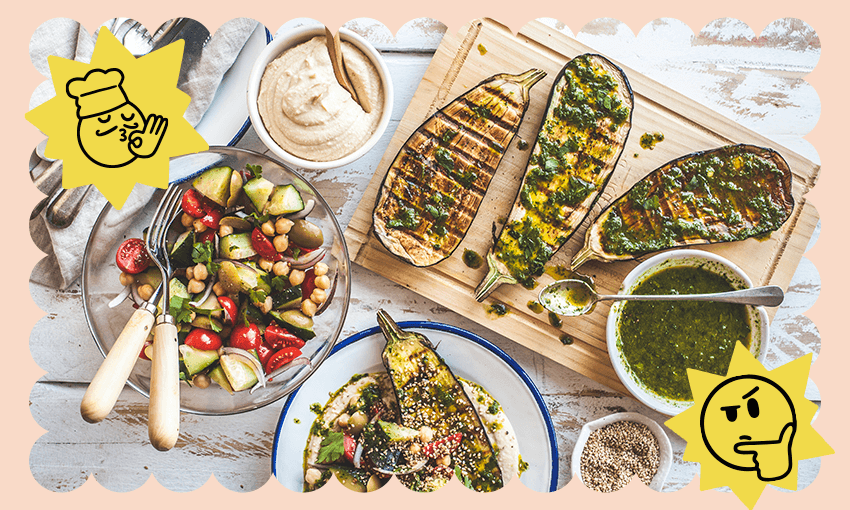When The Spinoff’s Chris Schulz wrote about an essentially unsuccessful week of feeding his family a plant-based diet, plenty of plant-based people took umbrage. Nate Ridley penned this response.
My Sunday morning was full of talk about vegetables. That’s not unusual – that day is when my partner and I plan our meals for the week. But it had been made extra spicy by having just read Chris Schulz’s story about trying to get his family to eat a plant-based diet for one week.
Seeing our way of eating presented as well-meaning but ultimately kind of gross and too difficult to maintain was, frankly, annoying. The truth is, as with most things, eating mostly plants can be great, but it might require employing a little brain power at first to get out of old habits and ways of thinking.
Shifting towards eating more plants doesn’t have to mean giving up on animal products entirely. I’m not a vegan, I love butter. I’m not even a vegetarian. My partner and I still eat meat, just less of it. A lot less. As a culture, we’ve readily accepted the idea of “sometimes foods” like cake and takeaways, foods that can be harmful to our bodies when we eat too much of them. In our household we take the same approach to meat; the only difference is that the harm we’re trying to minimise is to our environment.
Usually we aim to have only one meat-based meal a week, and it’s actually turned out to be great. Let me tell you, diverting our food budget towards mostly vegetables saves a lot of money, which means we feel way more comfortable buying nice cuts of meat for those meat meals that we do have. It’s a treat food, not a staple, which means we are able to serve it that way.
That’s the problem with the meat substitutes that Chris leaned on in his week of plant-based eating. They take eating a plant-based diet and make it more expensive than eating meat. Then, on top of that, they’re generally disappointing on the plate – but of course they are! You’re comparing them to the real thing, and as convincing as something like Impossible meat can be, it’s never going to be quite the same. Think of it like CGI in a movie: it can seem incredibly real, but deep down your brain is very good at spotting the tiny things that are wrong about it.
I totally understand the market for fake meats. Real meat is tasty! That all too often gets lost in this discussion. It’s really easy to get meat to taste good. From its ready abundance of fat (a key ingredient in tasty food) to its willingness to brown in a pan, getting a delicious meal out of meat feels like way less of a mission than cooking an equally good vegetarian meal. If your cooking habits are centred on meat it can seem daunting and unappealing to change to eating a bunch of vegetables.
To make matters worse you may well have been turned off plant-based food by past experiences. All too often vegetarian or vegan foods are bland, flavourless and a little sad. I put this down mostly to lack of salt, a side-effect of those two diets’ crossover with the healthy eating movement. Here’s a little secret that my chef friend told me years ago: “salt is flavour”. When salted well, almost anything becomes tasty. Want to know why restaurant food almost always tastes better than when you cook at home? They salted your food properly. A bunch of behaviours from people with meat-heavy diets make more sense when you remember this. Lots of people augment or append otherwise plant-based meals with bacon or sausages, saying that it makes it taste better, and that is true. But take a look at the dietary information on a packet of those meats, and then connect some dots.
Of course, it’s not just as simple as salting your food. Learning to construct entire meals out of mostly vegetables can feel challenging, but there are definitely ways to make it more achievable. Buying one or two good seasonal cookbooks is an absolute game changer, especially if they’re locally written and based around the vegetables you can likely find in your regular supermarket. Having a bunch of recipes on hand that can guide you on making the most of cheap seasonal vegetables takes a whole lot of stress out of planning a week’s worth of meals.
And honestly, I find great joy in the diversity of food that we manage to cook. Eating mostly plants has not in any way narrowed the kind of foods we eat. Stir fry, curries, pasta, lots of hearty soups through winter, quick and easy slaw and halloumi wraps in summer. We try to attempt at least one new recipe each week and while they’re not all going to be winners, they’re usually pretty good. From time to time something is good enough that it becomes a staple. This chickpea curry recipe from Emma Galloway is a regular in our house, and is good enough that guests always ask for the recipe.
Ultimately we’re not trying to live a holier-than-thou lifestyle. We’re not special; that’s sort of the point. If it’s achievable in our life, it’s achievable in yours. We manage to do this while also cooking gluten-free due to my partner’s coeliac disease. Her diagnosis initially seemed like it would result in challenging dietary changes, but what at first seemed incredibly difficult to manage very quickly became just normal, something that didn’t even warrant thinking about. That has also been our experience of eating mostly plants; it very quickly became normal, then easy, and now I don’t think you’d ever convince me to go back.





